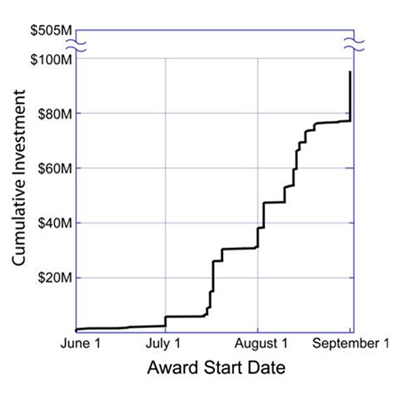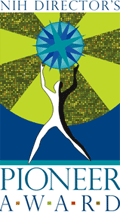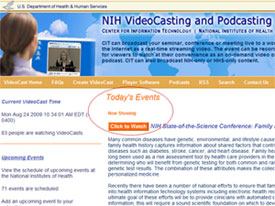On Monday, Francis S. Collins, M.D., Ph.D., became the 16th director of the National Institutes of Health. He was nominated by President Obama on July 8 and unanimously confirmed by the U.S. Senate on August 7.
Dr. Collins is well known in the scientific community and is very knowledgeable about NIH at all levels, serving as the director of the National Human Genome Research Institute from 1993-2008 and being a productive intramural investigator. NIH issued a news release with more biographical information.

Shortly after being sworn in, Dr. Collins held a town hall meeting with NIH staff. In his remarks, he eloquently outlined his vision and priorities, which include securing stable funding for biomedical research, training the next generation of scientists and nurturing early stage investigators.
I had my first opportunity to work closely with Dr. Collins soon after I came to NIH in 2003. It was in the context of the Molecular Libraries Initiative of the NIH Roadmap for Medical Research, which includes the PubChem database. As a chemist, I was very interested in the initiative’s potential for building new linkages between chemistry and biomedical research.
In these and other interactions, Dr. Collins impressed me with his passion for principles, strategic thinking and careful preparation. I share the sense of excitement and optimism he expressed at the town hall meeting regarding the opportunities that lie ahead.
I encourage you to watch the hour-long video of the town hall event.



 NIH has announced the 2010 competitions for the NIH Director’s Pioneer Awards and the NIH Director’s New Innovator Awards. These awards support exceptionally creative scientists who propose highly innovative—and often unconventional—approaches to major challenges in biomedical or behavioral research. Both programs are part of the
NIH has announced the 2010 competitions for the NIH Director’s Pioneer Awards and the NIH Director’s New Innovator Awards. These awards support exceptionally creative scientists who propose highly innovative—and often unconventional—approaches to major challenges in biomedical or behavioral research. Both programs are part of the 
 Since my last post about PSI:Biology, I’ve received lots of questions about the initiative and the new funding opportunities. To answer these questions more broadly and encourage more applicants, we’re hosting a live
Since my last post about PSI:Biology, I’ve received lots of questions about the initiative and the new funding opportunities. To answer these questions more broadly and encourage more applicants, we’re hosting a live 

